#when i was done sketching brock i was already like 'this might be the best thing ive ever drawn'
Explore tagged Tumblr posts
Text

had an idea in the shower
#the venture brothers#vbros#venture bros#brock samson#dean venture#hank venture#admin draws#fanart#my hair was still damp when i sat down lololol#when i was done sketching brock i was already like 'this might be the best thing ive ever drawn'#and you know what i stand by it. mediocre coloring aside
591 notes
·
View notes
Text
on “having it both ways”: thinking about S2 and looking ahead to S3
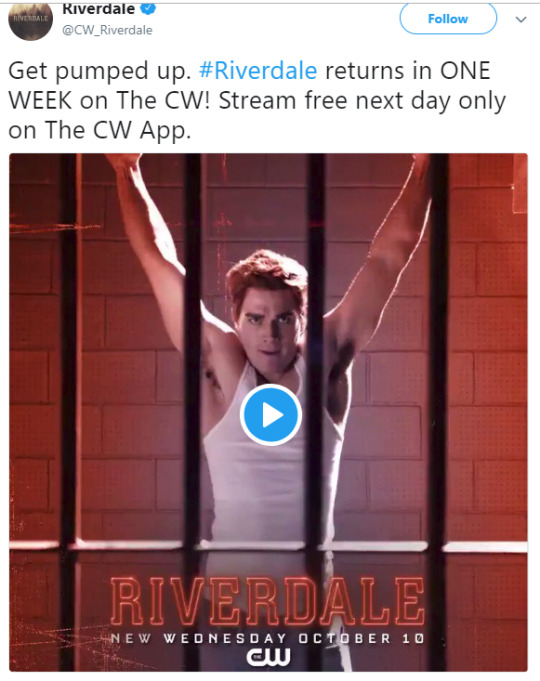
So apparently once a year I end up latching on to Riverdale pre-season promo and having WAY TOO MUCH to say about it.
Image analysis, pop-culture riffing, S2 criticism, meditations on resistant reading, my own discomfort with “wrongfully accused” narratives in this particular historical moment, and some hopes on the literal eve of the S3 premiere, below the cut...
So, last week when this piece of promo dropped, the very first thing that I thought of was the visual reference to Chicago and the Cell-Block Tango.
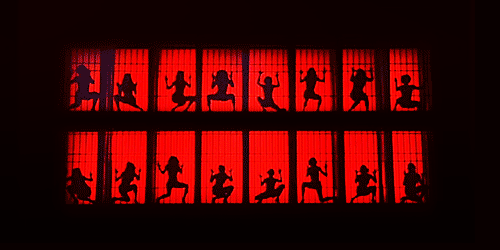
(I didn’t do it! - but if I’d done it? - how could you tell me that I was wrong?)
HOW perfect is that homage? The red lighting, the raised arms? The promo still just FEELS like a snapshot from a Fosse dance routine. (A little more on legendary choreographer Bob Fosse here.)
It’s a defiant pose, right in the center of the frame, but a slightly vulnerable one at the same time. There’s nothing hidden here; everything’s on display. The pose draws the viewer’s eyes inescapably to the body - a muscled body, but one which here seems like a gymnast or dancer’s body: lithe figure, tapered waist, power that is channeled into performance.
youtube
(this is tasty; this is plenty; this is hungry work)
So, on a first pass, insofar as it puts this demonstrative male body on display, it’s a little bit of a subversive image, I think. And that’s well in line with the way that Riverdale so often courts the female (and/or gay male) gaze, and at its best does some really unusual stuff with masculinity.
I thought about all of this - and then, silly me, I saw that this piece of promo was NOT a still, but is, instead, a short clip.
Archie doing pull-ups on the prison bars, as another heavily muscled dude saunters behind him, reads to me like a completely different type of performance! To the degree that it invites the eye, it sends the message: don’t fuck with me. In motion, we have purely the pursuit of greater strength, the purging of weakness in favor of the means of self-protection.
Instead of Chicago, my mind jumps to 3x01′s title source: Fortune and Men’s Eyes. Dominate or be dominated.
Realistically, I’m willing to believe that the ambiguous interpretation here between “still” and clip is just a quirk of how it happened to be uploaded to Twitter by a social media intern.
Still - the interpretative gulf between the still image and the image in motion got me thinking how often Riverdale seems to want to “have it both ways,” and what that does to the audience’s experience and expectations of the show.
For instance:
Other people have written at length about how Riverdale’s pursuit of aesthetic homage or plot contrivance has created character inconsistencies that occasionally baffle. Cheryl is alternately a tragic Gothic heroine and a lacquered, ruthless Mean Girl; Jughead is both a sensitive loner writer and also a bad-boy gang leader; Betty is both Betty and Dark Betty. (GOD.)
Other folks have discussed how the show needs to really play out the consequences of conflicts between the characters. It’s not that the show shouldn’t drop bombshells like the Bughead breakup(s) or the conflict between Betty and Veronica/Jughead and Archie, but it seems all too willing to reset back to milkshakes in a booth at Pop’s without doing enough work to explain WHY things are okay again. (See also: resolving major conflicts between characters literally with a song.)
The desire to “have it both ways” also really shows up in the show’s tendency to engage complicated issues (racism, sexism, colonialism, the prison-industrial complex) on a shallow level - thus getting credit for mentioning them, without really taking the time to explore them meaningfully or to explain the characters’ investment in them.
The result of this, in terms of storytelling, is that you leave a lot of room for resistant (even combative) readings of the text to emerge. To name a few of my own:
frustration with Jughead’s acceptance of what feels like a suuuuper patriarchal role as “the Serpent Prince” (and later King)
the fact that it’s really hard to sympathize with Veronica throughout entire swathes of season 2
a profound opposition to a storyline that sexualizes Betty’s mental health issues in a really exploitative fashion
And then... there’s Archie.
In the “Cell Block Tango,” the murderesses of Chicago (bar one) get to justify their crimes. Conversely, as we open the third season of Riverdale, the audience knows that Archie’s being blamed for something he didn’t do. Despite bragging about it (!!) to a bunch of mobsters (!!!!), Archie is not guilty of the murder of Cassidy Bullock.
...but he IS guilty of so! many! other! things! across Season 2. I’m sure I’m forgetting some, but aiding and abetting a criminal, covering up a murder, blowing up a car, and forming an extralegal vigilante militia group - TWICE - all come to mind.
The last bits of S2 offer us a version of Archie’s amends-making that comes in the form of defending the Serpents, turning on Hiram, supporting his father, et cetera. And then the very last image of S2 - Archie being clapped in cuffs right at the moment that he’s supposed to be sworn into office - is meant to distress us.
But a season of watching Archie embrace fascism leaves some marks, y’all. And a not insignificant portion of the audience, still frustrated with the character’s choices, couldn’t help but say - well, he had it coming.
So, yeah. It’s been a few months between the close of S2 and the open of S3, and in most cases that would be enough time for me to sit with the story in and of itself, to consider more broadly where it had failed or succeeded, and to allow some of that “resistant reader” response to drain away.
But real talk, you guys: I’m finding it really hard right now, at this moment in American history, to connect emotionally with the story of a young man trying to fight the charges of which he has been wrongfully-yet-ever-so-plausibly accused.
[Please note, I am NOT trying to say that RAS is somehow trying to weigh in explicitly on the SCOTUS debacle. The S2 finale laying the groundwork for this plot aired this spring, and S3E1 has (presumably?) been in the can for a while now. And, to its credit, Riverdale has in both seasons explicitly criticized a sexual culture that objectifies young women and reduces them to “points” (the football team’s playbook) and to prey (Nick St. Clair).]
But, for me personally, I can’t help looking at this plot and hearing echoes of “It's a very scary time for young men in America when you can be guilty of something you may not be guilty of.”
Here’s the interesting thing: I think RAS knows this, and I think the promo around this plot is partially designed to try to dispel these connections.
(For me, at least, it’s having mixed results.)
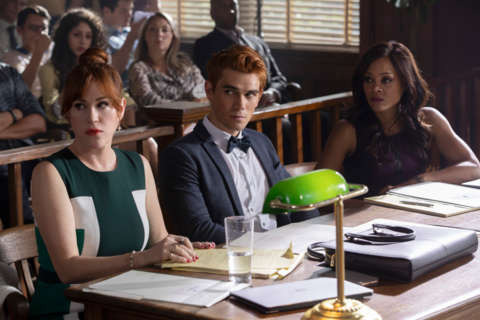
(source)
For instance, I can’t look at this still (young man, formal suit intended to project good character and youthful vulnerability, sullen face, flanked by counsel) without thinking, “Wow, this feels....Brock Turner-y.”
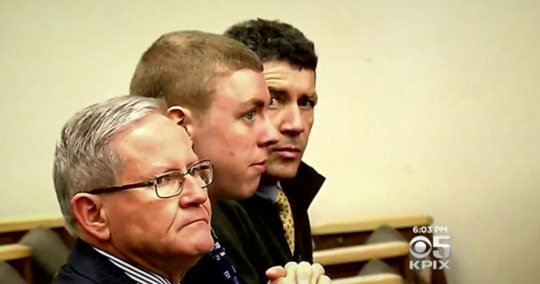
I don’t know if anyone’s written about courtroom photos and sketches as a genre of visual composition, but I feel like I’ve seen variations of the Riverdale still a million times, often printed on the front page of the local university newspaper, discussing the controversy over the conviction (or NON-conviction) of a promising young athlete accused of something awful that no one who knows him EVER would have suspected he would do. (Nice boy, nice family, so many extracurriculars, such good grades!)
Of course, there’s a major difference between the photos above: Archie’s defense team is entirely female.
Obviously this makes sense because Mary Andrews and Sierra McCoy are both major supporting characters who are also lawyers - but it also makes sense in trying to dismantle some of the potential gut reactions to this visual framing. There’s some “innocence by association” going on here, I think. And after all, Archie IS innocent of this particular crime!
This still lands with mixed effect for me though, because any defense strategy that suggests the intentional composition of a visual tableau feels inherently cynical, even when the character is sympathetic or innocent.
For instance: I just watched The Marvelous Mrs. Maisel, which features a scene where the main character shows up in the courtroom in full Upper West Side respectable regalia to try to get the obscenity charges against her dismissed - she fails and ends up having to plead guilty, because she mouths off at the judge. Anyone who’s familiar with Amy Sherman-Palladino’s work will recognize this bones of this plot point in the courtroom scene in Gilmore Girls: Rory’s grandparents’/lawyer’s attempt to portray her as a naive little angel backfires, and she ends up getting a ton of community service as penance for stealing a boat. It’s important to note that the characters are both guilty of their charges - although, as another favorite show of mine might note, “the situation’s a lot more nuanced than that.”)

(source | source)
Another way in which the pre-season promo is distancing Archie from both his actions last season, and the present context external to the show, is to emphasize his profound contrition. In this teaser from Riverdale 3x01, we get Archie declaring that “whatever happens to me in the courtroom on Tuesday - that is what I deserve.” This a statement of universal guilt and responsibility (one might say martyrdom?) that goes well beyond the scope of his actual infractions.
Now - I really, really appreciate that we’re getting a sad Archie rather than a mad Archie. And I want to acknowledge that he’s so definitely a kid here, trying hard to “man up” and to grapple with the fact that he screwed up big time and that there are consequences for his actions. After a season of doing the wrong thing over and over and OVER again, he’s trying to do the right thing.
But here’s the thing: Fred responds to this confession of near-universal guilt with what (in this snippet) feels like a pair of universally-exculpatory statements: “You are a good kid. You got manipulated by a mobster.” (Mary is more nuanced: “You do not deserve to be framed for murder.”)
Archie does not deserve to be framed for murder, and he certainly did get manipulated by a mobster. In fact, I would like to formally start a petition to have Archie not fall under the control of an unscrupulous adult in S3!
However.
Instead of accepting guilt for anything and everything and being immediately absolved for non-specific sins because of his inherent “goodness,” I really want to know that Archie understands what he actually DID do last season. He climbed wholeheartedly on board with the plan to Make Riverdale Great Again, and in that process, he did things that were NOT AT ALL commensurate with being “a good kid.” I think both the character and the show would benefit from a more explicit meditation on exactly why Hiram’s manipulation was so effective, and why Archie moved so quickly past being merely Hiram’s pawn, and voluntarily embraced the role of Hiram’s very ambitious accomplice.
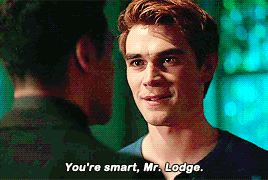
One of the specific preconditions of restorative justice is that the offender has to acknowledge their actions and the hurt that they caused. Reconciliation and vagueness are incompatible for so many reasons, but one of them is because a BIG part of learning from your mistakes is thinking precisely about what you did so that you can choose not to do it again.
I read a bunch of the new Archie comics over the break, and I think I now have a greater appreciation for the trope of Archie as a schlemiel. Despite his best intentions, the Archie archetype keeps making the same goofy, klutzy mistakes over and over again. This is fine, even funny, when it means that Archie just keeps accidentally ending up with a bucket on his head. Whoops!
It is super not okay if it means that Archie just keeps finding himself supporting fascists. ...whoops?
(At present, my entire country is being “manipulated by mobsters.” Clearly, I have some feelings about this.)
I don’t actually know how to wrap all the loose ends of this analysis up meaningfully and coherently at the finish here - but then again, that probably puts me into good company with our showrunners. Optimistically, I’m going to hope that that’s intentional - that I’m judging in media res, and that plotlines and character arcs in S3 will weave together in a way that will surprise and delight me!
But mostly, I’m going to reiterate my hope that S3 makes meaningful choices. That the people in charge don’t waste their actors’ time filming oodles and oodles of material that gets sliced and diced to ribbons. That they make choices EARLY about major plot points; that they stick to them; and that they let the rising action and falling action of your narrative reflect those choices, and the consequences that naturally accompany them.
I hope that the people in charge of S3 will resist the ever-present temptation to “have it both ways” - which ultimately works out to really no definitive way at all. Telling a sturdy story is risky in a totally different way than courting controversy - but it’s so, so worth it.
#riverdale#riverdale meta#riverdale spoilers#archie andrews#us politics#scotus#the urge to overanalyze this image feels like the tug of a Portkey behind my navel#was already a tag#spoiler: resistance was futile#chicago#marvelous mrs maisel#gilmore girls#village-skeptic: back on her bullshit#if you made it through this whole thing I love you to bits!
50 notes
·
View notes